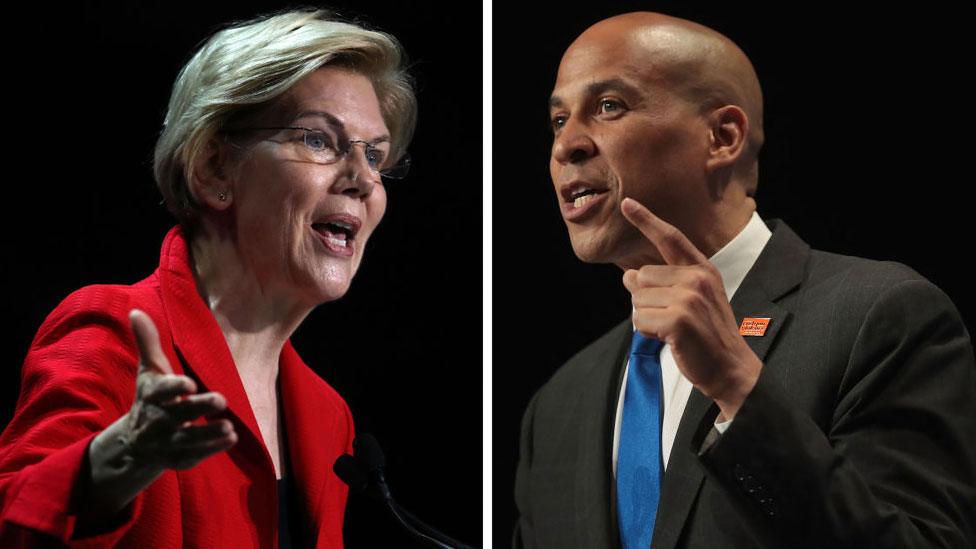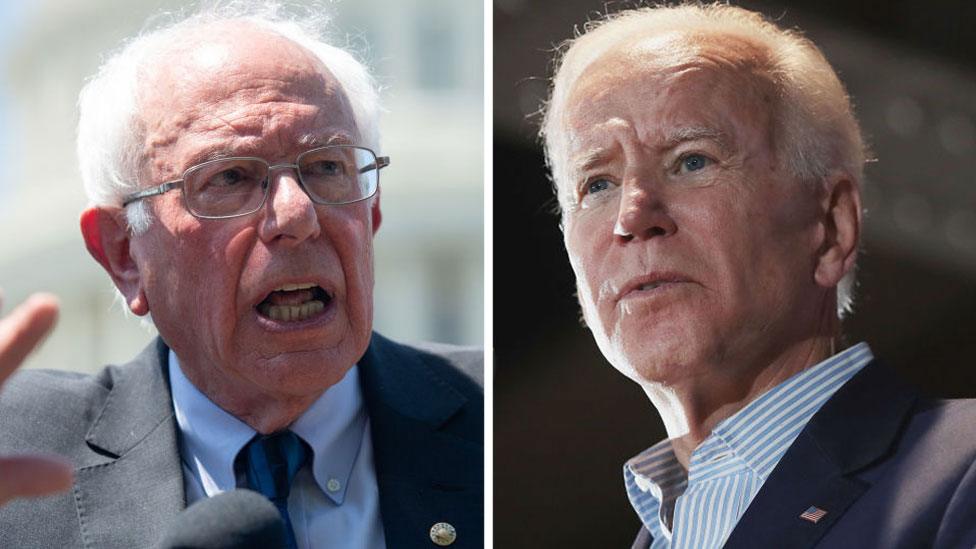US election 2020: What to expect in Democratic debates
- Published

Elizabeth Warren and Cory Booker
The first Democratic debates are like the opening round of a golf tournament. There's no way to win the prize right now, but plenty of ways to lose it for good.
The candidates, their visions and their plans will be put in the crucible on Wednesday and Thursday night. There will be more tests to come, but this is the first real chance to see how they hold up under pressure.
Here are five things to keep in mind as we settle in for the opening volleys of what is going to be a very long campaign season.

Big night for Warren
While the second debate night is getting most of the press, the first presents an interesting opportunity for the participants. Elizabeth Warren is the hot candidate right now, but this isn't the World Cup. There are no easy draws. The other candidates will have plenty of chances to make an impression in the two-hour proceedings.
Unlike the Republican "kids' table" debates four years ago that were largely ignored, the national media will be covering the event in full and looking for storylines beyond "Warren has plans".
That's an open door for Cory Booker, Amy Klobuchar and Julian Castro to find the spark that's been missing from their campaigns so far. Beto O'Rourke could recapture the magic from his 2018 Senate bid. Bill de Blasio might show he's more than just a New York tabloid punching bag. Washington Governor Jay Inslee will have a national audience for his climate-change pitch, as will Tulsi Gabbard for her visions of world peace and Tim Ryan for his blue-collar Ohio populism. John Delaney… will also be there.
The shelf life for buzz from the first debate will be short - but a night of good press is better than none at all.

Bernie v Biden
This has been the marquee matchup ever since the debate line-ups were first announced. Joe Biden is the undisputed front-runner for the Democratic nomination at this point. Bernie Sanders was the runner-up in 2016 and posted the biggest fund-raising numbers in the first three months of 2019 (before Biden entered the race).
Both candidates are also the only ones on stage who have presidential campaign experience and know what it's like to be in one of these multi-candidate scrums.

Sanders and Biden
It seems all but certain that there will be fireworks between the two septuagenarians. The Vermont senator will try to portray the former vice-president's calls for moderation and bipartisanship as woefully out-of-step with the current mood of the Democratic Party and an ineffective way to motivate core voters. Biden will counter that Sanders is too extreme and his proposals are unrealistic.
It could all be eerily reminiscent of the 2016 face-offs between Sanders and Hillary Clinton - only this time, there will be a crowd of other candidates waiting to get in on the action. Biden could get pummelled because he's at the top of the pack. Sanders may face sharp attacks from the centrists in the field. Both are susceptible to generational attacks from the younger candidates
It's an unstable dynamic that could turn into a feeding frenzy if there's blood in the water.

Yang-mentum
Eighteen current and former political officeholders are debating in Miami this week. Then there's businessman Andrew Yang and self-help author Marianne Williamson. They had enough support to meet both of the Democratic National Committee's debate criteria, while a current governor (Steve Bullock), congressman (Seth Moulton) and mayor (Wayne Messam) are left to watch from the sidelines.
Now Yang and Williamson have a chance to prove their inclusion is deserved, and not just an embarrassing flub by the debate organisers.
Of the two non-politicians, Yang may have the most potential. He's an affable tech entrepreneur with a big idea - a universal basic income - that lends itself to easy soundbites in a crowded field. He's built a loyal following through online advertising and non-traditional media appearances, so clearly his message resonates with some.
Williamson has ignited controversy with her recent comments comparing government vaccination requirements to abortion bans - a view that not only runs counter to scientific consensus but also has angered abortion rights advocates. The former spiritual adviser to Oprah Winfrey may have her own devoted fans, but on the eve of the debate she's making headlines for all the wrong reasons.

Who will take on Trump?



What's the big issue?
The moderators will try to cover a wide range of issues over the course of two nights. Something to keep an eye on through both debates, however, are the topics candidates talk about when given a choice.
Warren, of course, has a plan for almost everything - but what does she push the hardest? Sanders just made student loan forgiveness his most ambitious proposal to date. Does that mean he will focus on education, or will he return to his old standby, income inequality?
Inslee will talk about climate change, of course. O'Rourke seems to find his strongest voice on immigration, while Kirsten Gillibrand highlights women's issues and Biden pushes help for the middle-class. Will anyone mention slavery reparations, a hot topic in Congress last week? Or how about Iran, the latest foreign policy crisis?
Four hours of debating over two nights won't necessarily reveal what Americans think is important, but it could offer clues about what the candidates think Americans think is important.

The man who isn't there
Donald Trump will be on a plane to the G20 summit in Japan by the time the first debate starts, but his presence will be felt by everyone on the stage. Polls show Democratic voters above all else went a nominee who is able to go head-to-head with the president and win. That means being able to withstand his acrimonious style of campaigning, the nicknames, the derisive tweets and his uncanny ability to dominate the news cycle.
This week will be their first big chance to show they know how to take a punch and, perhaps, land a few on the president. But where do they aim? Foreign policy, immigration, the environment and presidential demeanour could all be appealing targets, but the candidates are going to have to decide where best to spend their limited time.
Impeachment has proven to be a big applause line for candidates like Elizabeth Warren, Kamala Harris and Cory Booker. When the topic comes up, will the other candidates get caught up in the frenzy or preach caution?
Mr Trump may not have time to watch the debates live, but the cable-news junkie will be paying attention to how it's covered. If he decides to engage some of his potential opponents after the fact, it could be an opportunity for them to hold the post-debate spotlight - for better or for worse. And if he or she ends up the Democratic nominee, it will only be a taste of things to come.

